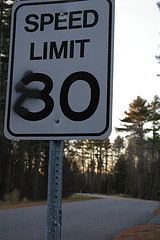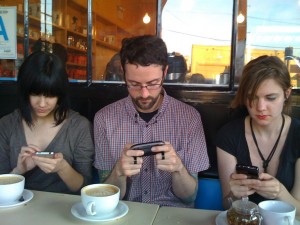 John Freeman has written a wonderful manifesto about slow communication. He talks about the blessings of the Internet age, but then changes the perspective and really makes you think differently.
John Freeman has written a wonderful manifesto about slow communication. He talks about the blessings of the Internet age, but then changes the perspective and really makes you think differently.
He starts with a quote that might has well been taken from my book (same subject / anecdote):
“My friend has just had his PC wired for broadband,” writes the poet Don Paterson. “I meet him in the café; he looks terrible—his face puffy and pale, his eyes bloodshot. . . . He tells me he is now detained, night and day, in downloading every album he ever owned, lost, desired, or was casually intrigued by; he has now stopped even listening to them, and spends his time sleeplessly monitoring a progress bar.
In my book I point out that more isn’t the same as better. Just because Google has 3 billion results for your query, that doesn’t mean that you are obliged to look at all of them. Freeman poses the same question about email. Just because you can do 3 messages per minute, that doesn’t mean that you should.
It is time to launch a manifesto for a slow communication movement, a push back against the machines and the forces that encourage us to remain connected to them.
Freeman continues touching subjects of my book, stating that “The Physical World matters“. Visiting a cafe for coffee isn’t what it used to be. Instead of a pleasant place for conversation, these have turned into places where you hear the continuous, insect-like patter of typing on keyboards.
If we spend our evening online trading short messages over Facebook with friends thousands of miles away rather than going to our local pub or park with a friend, we are effectively withdrawing from the people we could turn to for solace, humor and friendship, not to mention the places we could go to do this. We trade the complicated reality of friendship for its vacuum-packed idea. Which is a semantic representation of the “displacement hypothesis”.

I doubt it that Freeman has read my book, but the themes and insights are very much the same. Biggest difference is that he has a wonderful writing style and chooses his words wisely. Therefore I would like to end this blogpost with another quote:
We are connected, yes, but we were before, only by gossamer threads that worked more slowly. Slow communication will preserve these threads and our ability to sensibly choose to use faster modes when necessary. It will also preserve our sanity, our families, our relationships and our ability to find happiness in a world where, in spite of the Internet, saying what we mean is as hard as it ever was. It starts with a simple instruction: Don’t send.

Interesting read!